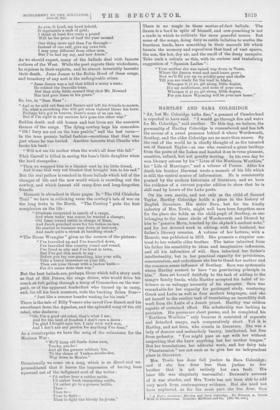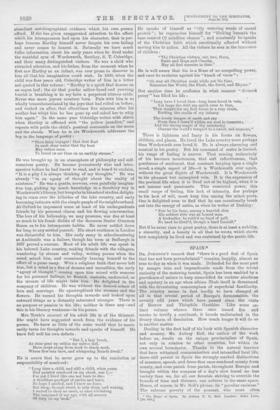HARTLEY AND SARA COLERIDGE.
"AY, but Mr. Coleridge talks fine," a peasant of Cumberland is reported to have said. "I would go through fire and water for Mr. Coleridge," said another. To this day, we believe, the personality of Hartley Coleridge is remembered and has left the savour of a sweet presence behind it where Wordsworth, Southey, and the elder Coleridge are no more than names. By the rest of the world he is chiefly thought of as the talented son of Samuel Taylor—as one who received a great heritage from the poets of the Lakes and banded it on in verse pleasant, sensitive, refined, but not greatly moving. In his own day he won literary esteem by his "Lives of the Northern Worthies," his "Life of Massinger," and a volume of Poems. After his death his brother Derwent wrote a memoir of his life which is still the central source of information. He is consistently praised by the modern historians of literature, and we have the evidence of a current popular edition to show that he is still read by lovers of the Lake poets.
On his own merits, and not only as the child of Samuel Taylor, Hartley Coleridge holds a place in the history of English literature. His sister Sara, but for the kindly industry of Mrs. Towle, might well have been forgotten save for the place she holds as the child-pupil of Southey, as one belonging to the inner circle of Wordsworth and likened by him to "pensive Morn, touched by the skylark's earliest note," and for her devoted work in editing, with her husband, her father's literary remains. A volume of her Letters, with a Memoir, was published in 1873. She presents a singular con- trast to her volatile elder brother. The latter inherited from his father his sensibility to ideas and imaginative influences, and all his infirmities of will. Sara inherited her father's intellectuality, but in her practical capacity for persistence, concentration, and orderliness she has to thank her mother and the common-sense influence of Southey. Sara was systematic where Hartley seemed to have "no gravitating principle in him." Sara set herself dutifully to the task of adding to the meagre family funds, while Hartley accepted his habit of in- dolence as an unhappy necessity of his character. Sara was remarkable for her capacity for prolonged study, mastering Greek and Latin as well as four modern languages, and she set herself to the routine task of translating an incredibly dull work from the Latin of a Jesuit priest. Hartley was seldom capable of sustained effort. His scholarship was lacking in precision. His poems are short poems, and he completed his "Northern Worthies" only because it consisted of separate and detached essays, each comparatively short. Yet it is Hartley, and not Sara, who counts in literature. She was a lady of demure and melancholy beauty, intellectual, but free from pedantry. "You might pass an age with her without suspecting that she knew anything but her mother tongue." But her translations, her editorial work, and her fairy tale " Phantasmion " are not such as to give her an independent place in literature.
Mrs. Towle has done full justice to Sara Coleridge; and if she has done less than justice to her brother that is not entirely her own fault. His later life was singularly uneventful: Derwent's account
of it was slender, and Mrs. Towle has not been able to add very much from contemporary evidence. But she need not have neglected, as for the most part she has done, that * A Poet's Children Hartley and Sara Coleridge, By Eleanor A. Towle Wlth 12 Illustrations. London: Methuen and Co. [10a. Od. not.]
abundant autobiographical evidence which his own poems afford. If she has given exaggerated attention to the effect which his intemperance had upon his character, that is per- haps because Hartley himself never forgets his own failing and never ceases to lament it. Naturally we have much fuller information about his early years when he lived under the watchful eyes of Wordsworth, Southey, S. T. Coleridge, and their many distinguished visitors. He was a child who attracted attention, and his father, from the moment when he first saw Hartley as an infant, was ever prone to discover in him all that his imagination could wish. In 1800, when the child was four years old, Coleridge writes of him in a letter not quoted in this volume : "Hartley is a spirit that dances on an aspen leaf ; the air that yonder sallow-faced and yawning tourist is breathing is to my babe a perpetual nitrous oxide. Never was more joyous creature born. Pain with him is so wholly transubstantiated by the joys that had rolled on before, and rushed on after, that oftentimes five minutes after his mother has whipt him he has gone up and asked her to whip him again." In the same year Coleridge writes with alarm when Hartley is afflicted with "the yellow jaundice," and repeats with pride the child's poetical comments on the moon and the clouds. When he is six Wordsworth addresses the boy in the language of poetry :
"Thou fairy voyager ! that dost float
In such clear water that thy boat May rather scorn To brood on air than on an earthly stream."
He was brought up in an atmosphere of philosophy and self- conscious poetry. He became prematurely wise and intro-
spective before he bad learnt to read, and is heard to exclaim, " It is a pity I is always thinking of my thoughts." He was already "in an agony of thought about the reality of existence." He was a gentle, nervous, even painfully imagina- tive boy, picking up much knowledge in a desultory way in Wordsworth's library, but irregular in his school studies, delight- ing to roam over the hillsides of the lake country, and early becoming intimate with the simple people of the neighbourhood. At Oxford he impressed some at least of his undergraduate friends by his personal charm and his flowing conversation.
The loss of his fellowship, we may presume, was due at least as much to his frank dislike of the decorous Senior Common Room as to his intemperate habits. He never settled down for long to any settled pursuit. His short residence in London was distasteful to him. His early essay in schoolmastering at Ambleside was a failure, though his term at Sedbergh in 1837 proved a success. Most of his adult life was spent in his beloved Lake country, making friends with the villagers, wandering by stream and valley, writing poems when the mood seized him, and occasionally bracing himself to the effort of a prose essay. With a religious faith that never left him, but a mind in a flux of dreams and unrealities, the early "agony of thought" coming upon him mixed with remorse for his personal failings, he floated, unstable, undirected, as the stream of life might take him. Ho delighted in the company of children. He was without the desired solace of love and marriage. He apostrophized the streams and the flowers. He turned his thoughts inwards and looked upon outward things as a distantly interested stranger. There is
o purpose or passion in his life; neither is there any—and this is his literary weakness—in his poems.
Mrs. Towle's account of his adult life is of the thinnest. She might have suggested much from the evidence of his poems. He knew so little of the outer world that he neces- sarily turns his thoughts inwards and speaks of himself. He knew full well his own defects :
"But I, a lazy brook,
As close pent up within my native dell, Have crept along from nook to shady nook,
Where fiowirets blow, and whispering Naiads dwell."
He is aware that he never grew up to the resolution or responsibility of manhood: "Long time a child, and still a child, When years
Had painted manhood on my cheek, was I,—
For yet I lived like one not born to die ; A thriftless prodigal of smiles and tears, No hope I needed, and I knew no fears.
But sleep, though sweet, is only sleep, and waking, waked to sloop no more, at once o'ertaking Tim vanguard of my age, with all arrears Of duty on my back." He speaks of himself as "idly watering weeds of casual growth" ; he reproaches himself for "Sinking beneath the base control Of mindless chance " ; and constantly he speaks of the Christian faith which emotionally affected without moving him to action. All the virtues he sees in the innocence of children:
"The Christian virtues, one, two, throe, Faith and Hope and Charity, May all find exercise in thee."
He is well aware that his is a Muse of no compelling power, and once he exclaims against his "knack of verse " : "Oh may all Christian souls while yet 'tis time, Renounce the World, the Flesh, the Devil, and Rhyme."
But another time he confesses in what manner "divines poesy" has filled his life : "Long have I loved thee—long have loved in vain, Yet large the debt my spirit owes to thee, Thou wreatlfdst my first hours in a rosy chain, Rocking the cradle of my infancy.
The lovely images of earth and sky From thee I learn'd within my soul to treasure ; • And the strong magic of thy minstrelsy Charms the world's tempest to a sweet, sad measure."
There is lightness and fancy in his forms on flowers, children, and places. He loved the Lake country more perhaps than Wordsworth ever loved it. He is always charming and musical in his poetry. But his command of metre is limited, his range of feeling is narrow. That musing melancholy of his becomes monotonous, that soft reflectiveness, that gentleness of sentiment, that constant harping upon a single mood, a single aspect of life—it is Wordsworth over again, without the great flights of Wordsworth. It is Wordsworth in his pleasant but uninspired vein. It is the expression of the poetical life when it is lived not at its highest, when it is not intense and passionate. This restricted power, this small range of feeling, this lack of intensity, due perhaps to his lack of will, must keep him among the minor poets. One is delighted even to find that he can occasionally break out into the energy of satire, as when he writes of Dodeley :
"Fair be his fame, among a knavish elan His noblest title was an honest man. A bookseller, he robb'd no bard of pelf, No bard he libelrd, though a bard himself."
But if he never rises to great poetry, there is at least a nobility, a sincerity, and a beauty in all that he wrote, which shows Low completely he lived and was sustained by the poetic life.























































 Previous page
Previous page